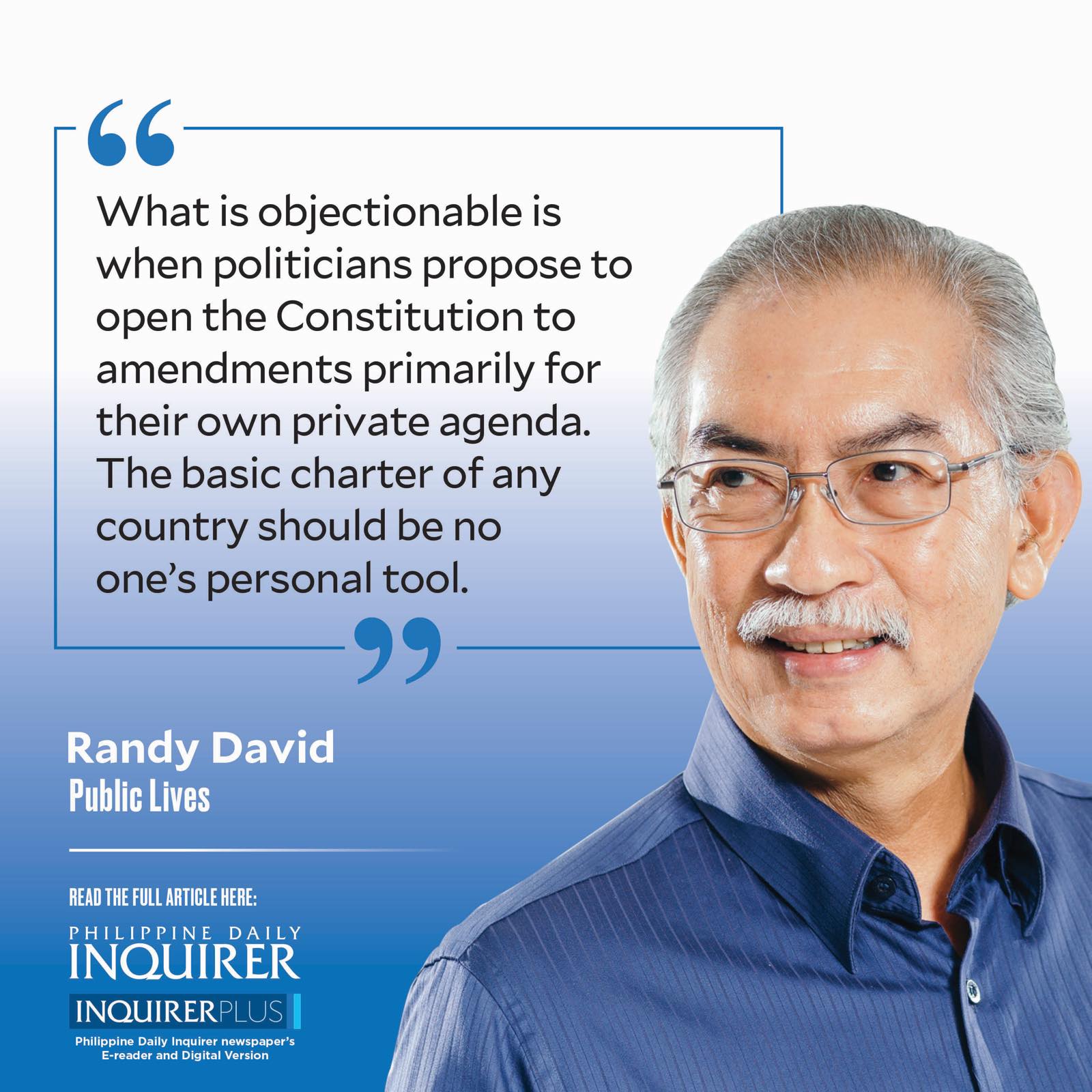The ‘Edsa-pwera’ ad

As yesterday’s Inquirer editorial (“When a Cha-cha ad backfires”) aptly put it, the paid ad that inundated primetime television early this week was “a poorly thought stunt that backfired if the intention was to gather public support for Charter change (Cha-cha).” That is if the intent was to mobilize broad support for constitutional change.
But, what if the real intent behind the ad was, in fact, to incite the broadest antipathy toward Charter change? Then, we may well say that the ad achieved its purpose. For indeed, the reaction to the advertisement was instant, passionate, and manifestly hostile to the whole idea of amending the 1987 Constitution at this time. Is it farfetched to imagine that this is exactly the public response that, for whatever reason, those who seek to preserve the current Constitution at any cost sought to generate?
On the contrary, what I find hard to believe is that a TV ad as sleek and as technically well-crafted as this could be so careless in its messaging. Perhaps, it wasn’t careless at all. By playing with the scornful word “Edsa-pwera,” a derivative of “etsa-puwera” (which means “excluded” in our language), the ad put the 1986 Edsa event at the front and center of its storyboard. The effect was to belittle not only the 1986 Edsa People Power Revolution, a cherished moment of national redemption but also the untold injuries inflicted on the nation by the dictatorship that came before it. Why would any serious proponent of Charter change want to do that? Bongbong Marcos himself knew better than to demean Edsa in his carefully planned route to the presidency.
In so framing their message, the makers and sponsors of the advertisement effectively triggered a debate on the whys and wherefores of Edsa, rather than on the current realities that a valid push for Charter change seeks to address. It is a debate that those who were at Edsa would definitely not shirk.
Rather than promote them, as the ad claims, Edsa ended the monopolies that the Marcos dictatorship created, entrusted to his favored cronies, and fattened with behest loans. Edsa welcomed foreign investors even as it terminated the United States’ hold on the country’s largest military bases, which had served as the linchpin of American control of our political and economic life. The 1987 Constitution contains some of the most progressive provisions one can find in any country that is aspiring to modernity. It explicitly bans political dynasties, a provision that, however, could only be activated by legislative action. The Constitution itself cannot be faulted for Congress’ failure to enact a law corresponding to this constitutional declaration.
I doubt that President Marcos or his first cousin Speaker Martin Romualdez would wish to premise a productive discussion on Charter change on the supposed failures of Edsa. They are back in power; the last thing they need is to open old wounds and awaken dormant animosities. That advertisement does them a disservice; I don’t believe they’re behind it.
Indeed, Mr. Marcos has managed to endear himself even to Edsa veterans by differentiating and distancing himself from the policies and impulsive governance style of his autocratic predecessor, Rodrigo Duterte. Why would he risk antagonizing them by blaming the post-Marcos Constitution for the country’s supposed stagnation?
Many of Edsa’s champions are hardly dogmatic in their views about the most suitable form of government for the country, whether this be presidential or parliamentary, unicameral or bicameral. I understand that the members of the Constitutional Commission that drafted the 1987 Charter were themselves divided on many questions.
What is objectionable is when politicians propose to open the Constitution to amendments primarily for their own private agenda. The basic charter of any country should be no one’s personal tool. It must be treated as a collective covenant — the product of the positive law-making power that resides ultimately in the people of a given state.
It’s important to bear this in mind because one of the oft-cited items in the Cha-cha agenda is the proposed shift to a full parliamentary system, where the occupant of the most powerful position in government is chosen by members of parliament rather than by popular vote. This system enables individuals who may not win the popular vote at the national level to bid for the office of the prime minister. Whatever the justification for the shift may be, it should never be to merely accommodate the ambitions of anyone who is not electable nationally. By the same token, opposition to a parliamentary shift must not be motivated by a mere wish to ensure that a “strong” presumptive candidate is not denied the presidency in 2028.
The parliamentary system has its advantages (e.g., it closes the gap between legislation and execution) and disadvantages (not the least of which is the relative ease with which parliament can be dissolved and, with it, the government of the day.) The choice of the best form of government is not an exact science. In any given system, what spells the biggest difference in outcomes is the political maturity of citizens who choose their nation’s leaders.
* * *




















